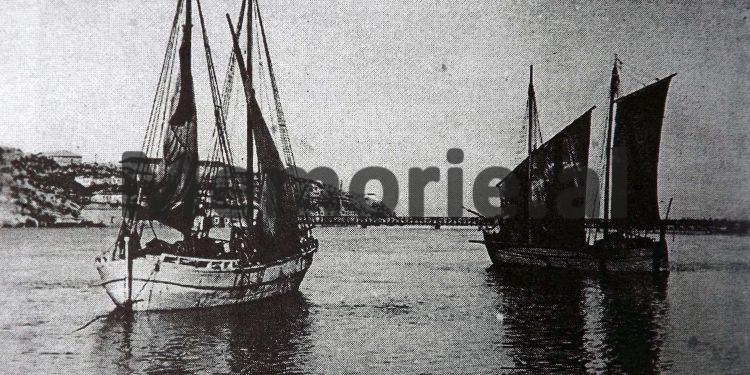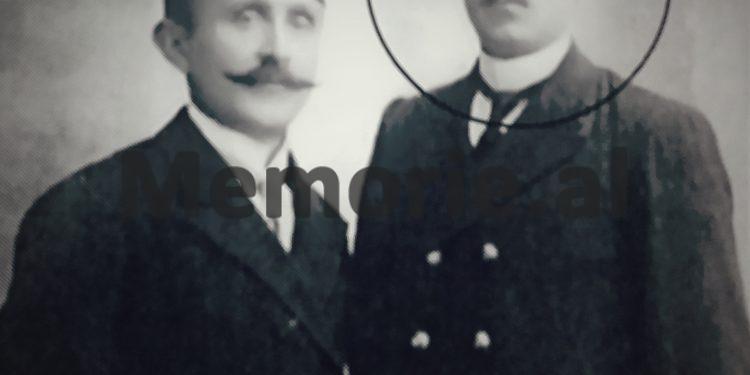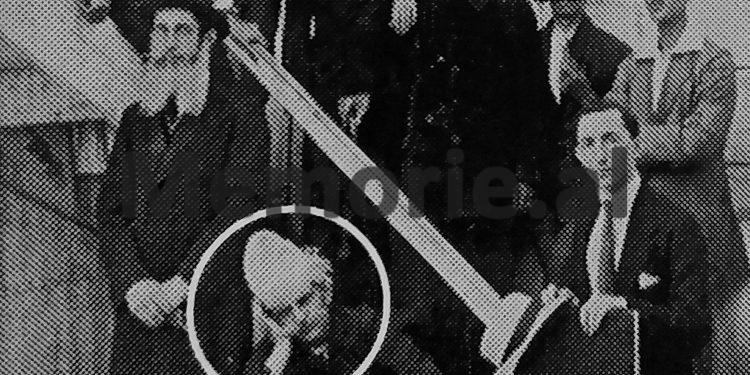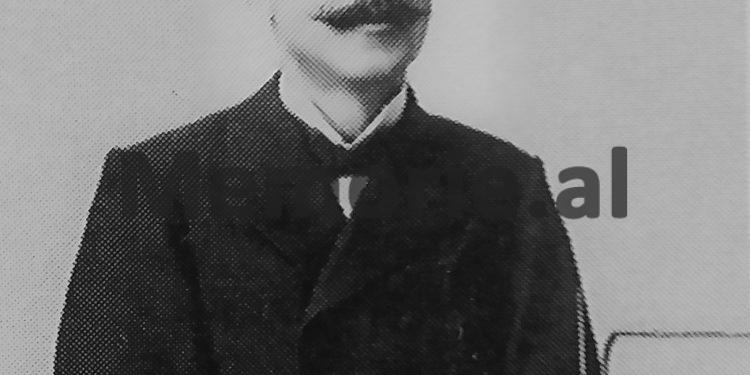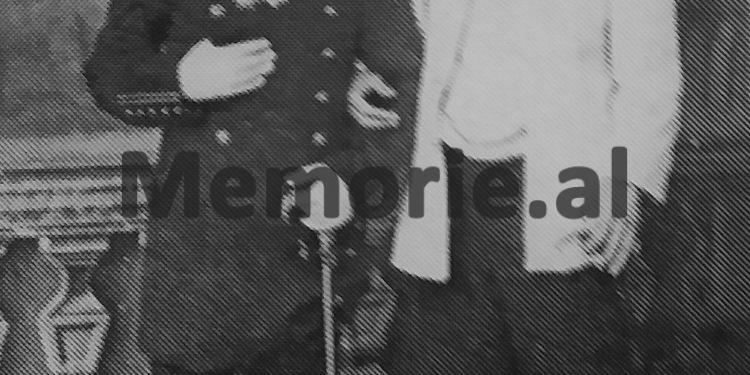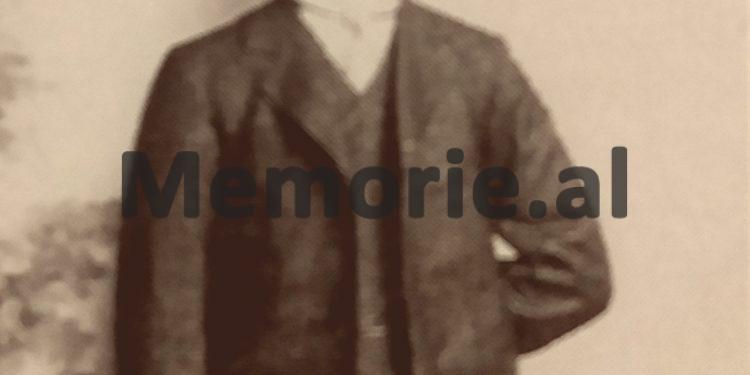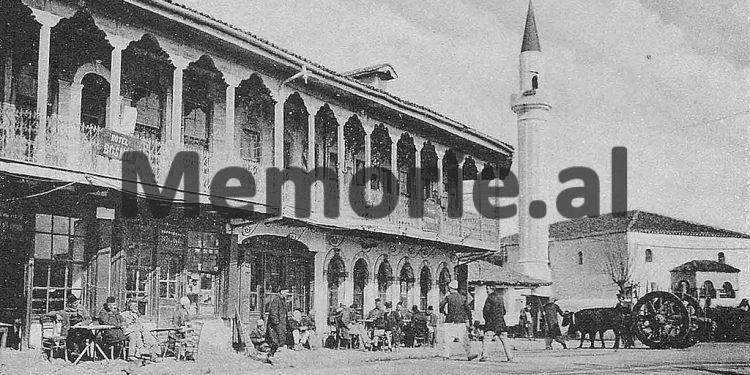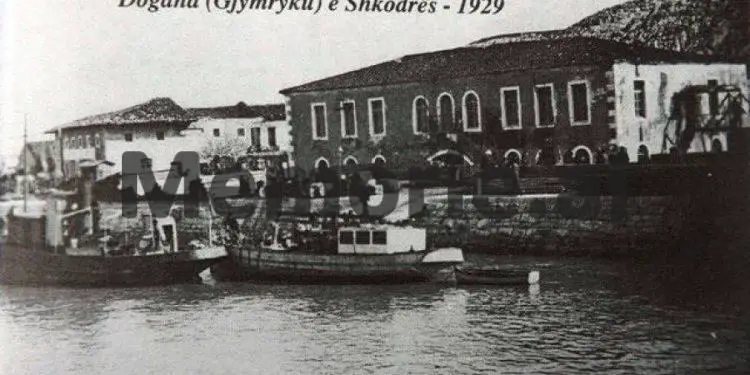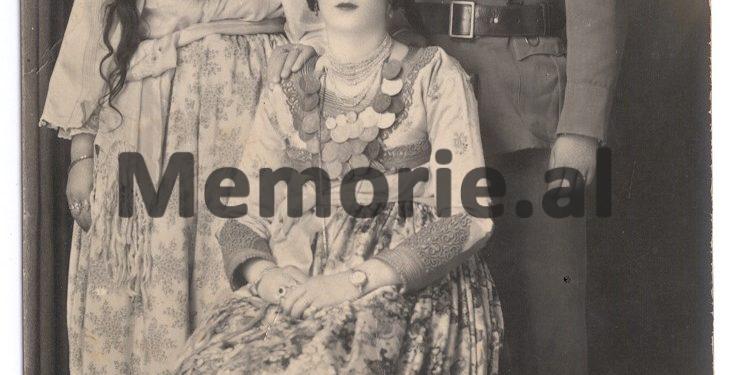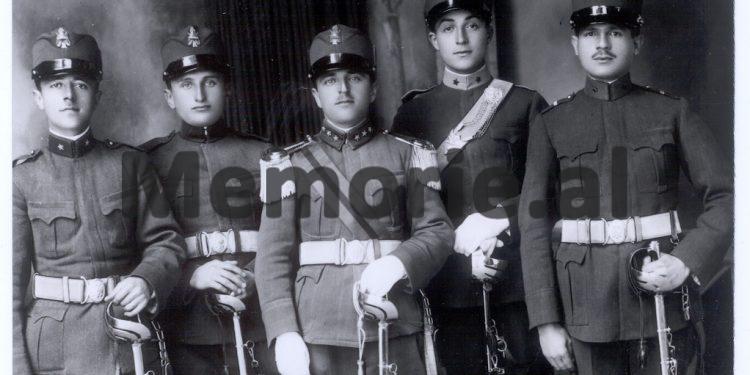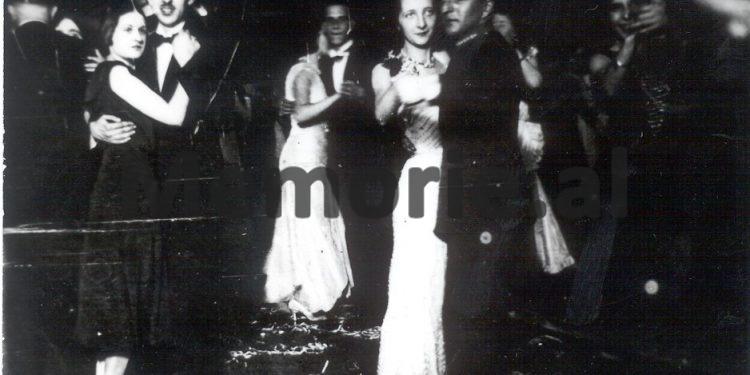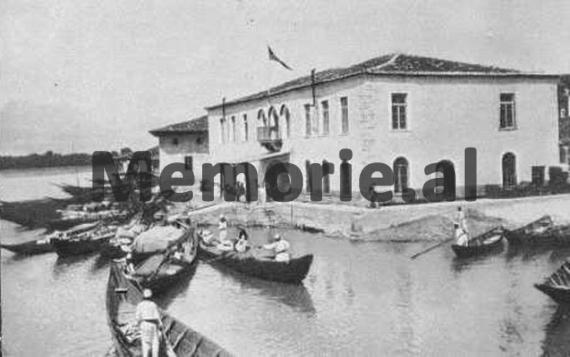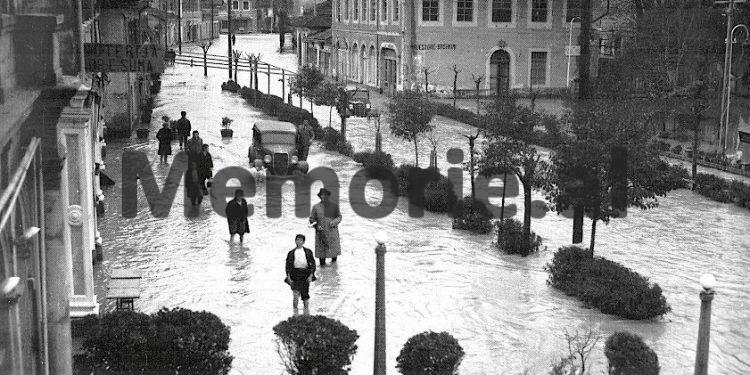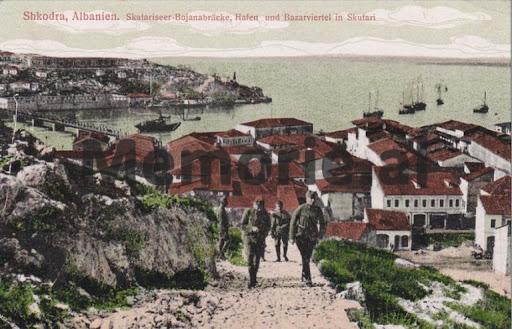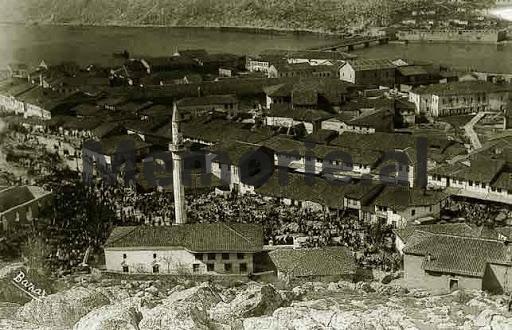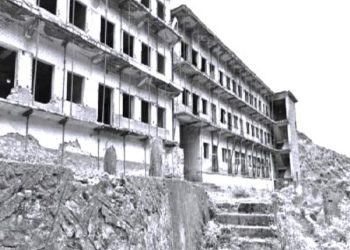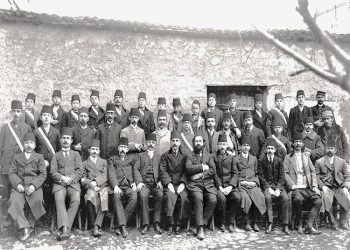Dashnor Kaloçi
Memorie.al publishes the unknown story of the large Borshi family with early origin from the village of Himara, where they inherit the surname, who have lived for years in the city of Shkodra, and who were educated and graduated in academies and universities well-known Europeans. Like: Qazim Borshi, a graduate in Naval Engineering of the transoceanic ships in the capital of the Ottoman Empire in Istanbul, who sank in the Buna River with his ship, refusing to go ashore (although he pulled out the entire crew and passengers), where his family and father were waiting for him. Shyqëri Borshi, graduated in Italy and decorated with the “War Medal” for his participation in the Italian army during the First World War, who while in Verona, set up and conducted a symphony orchestra, and when he returned to Albania in in 1924, served as military adviser in the Fan Noli government. During the years of the Zog Monarchy, he became active with the cultural and artistic societies in the city of Shkodra, performing in several theatrical plays as an actor and director, while during the fascist occupation of the country, he served as General Director of the Albanian Police, which for which he was sentenced to death by the communists in the trial of the “Group of Deputies” and was shot in 1947. The whole unknown and tragic history of the suckers of the large family, from the period of the Ottoman Empire to the present day.
The Borshiots are a prominent tribe who lived in the city of Shkodra and are known by this surname, due to their early origin from the Borshi of Himara. From this family came lawyers, soldiers, teachers, artists, engineers and other learned intellectuals, who after graduating from the most famous academies and universities in Europe, were persecuted in the most barbaric way by the communist regime of Enver Hoxha.
Famous borscht
The first of them is known as Sulejman Gapi, he was born and raised in Borsh and for unknown reasons, after receiving military education, he served in the army of the Turkish Empire, as a cavalry officer, with the rank of major and his service center was in Podgorica Castle. Even today in the lands of the Gapi family in Borsh, there is the Gapi Fountain. This family from Borshi had large lands and plantations with oranges, had houses in old Borshi, which was then burned. Suleiman often came to Borsh and there he married a girl from a neighboring village. Sulejmani was killed in 1858 by Serbo-Montenegrin forces in the Podgorica War. For his bravery, highland rhapsodists have woven songs, which are sung with lute. Sulejmani left a son, Nuri Borshin, at the age of 7 years. He took the surname Borshi after his death, because of his descendants, many of whom became famous personalities. One of the other descendants of this family was Nuri Borshi, who after graduating from the High School of Law in Istanbul, was appointed in the city of Podgorica. Then, for 40 years, he served as a lawyer in the city of Shkodra. Nuriu, from the first marriage had a son, named Qazim Borshi. After the death of his first wife, he married Hafize Hejbeli, the daughter of the director of the Bahçallek gymnasium, a widow from Tirana, also with a child, Ali, who grew up in the Borshi family. Hafiza’s brother had a mirror workshop in Istanbul. Hafiz was from the Hejbeli family, which was first married to Xhaferr Çabinaku from Libohova. Even today, the Borshiots inherit their grandmother’s properties in Libohova. Hafiz had four brothers: Hulusi (imam), Hamit, Osman, Ramiz and a sister Salih. The latter was married to a Turkish captain, and had a daughter, Emine, who died very young, while her husband was killed in the war in Anatolia. Hulusi lived in Tirana, while Hamiti, Osmani and Ramizi went to Istanbul. Hafiz had a son, Ali Çobani. This child was adapted by Nuri Borshi and since he was from Borshi, he was named Ali Borshi. Nuriu and Hafiza also had four children: Shyqyriu, Kadriu, Paqizja and Sezaiu. Nuriu was thin, tall and remembered as a very charitable man. He tried to open a night school for adults, around 1910-‘12, but it was sabotaged by fanatical elements. He had many friendships with Preng Bibë Doda of Mirdita and was their lawyer. He had a house in Parrucë (the house of the Çakic) while he had previously lived in Perash, at Arra e Madhe, where Sezai Borshi was born. Here is how the newspaper of the time “Besa Shqiptare” describes it (July 13, 1913, no. 33, page 3-4): “Nuri Effendi, the lawyer, is at the house of Cuk Frano Kraja, in Fushë të Çelës at the Saraj Bridge “Takes trials, writes all kinds of prayers and letters in Albanian and in other languages”. Whereas in the issue of May 25, 1913, in the same newspaper, among other things, it is written: “A group of lawyers and writers is found and appointed, headed by Lawyer Nuri Effendi Borshi in the office of the Printing House” Nikaj “in Giuhadol”. While in number 7, dated May 29, 1913, among other things, it is written: “Lawyer Nuri Effendi has been known for fifteen years now as a lawyer, he has known how to win the trust of everyone for justice and for resolving cases”. In 1921, he ran for deputy in the first Albanian Parliament. In the years that followed, Nuri Borshi cared for the orphaned grandchildren after the death of Ali Borshi (1923) and mother Lutfije (1924). According to the memoirs of the famous writer and cleric, Ndoc Nikaj, where he talks about the concessions of the forests of Mirdita, with the company “Vismora” and the permit that had to be issued in Istanbul, it is written: “for metro lands, to be cut in those forests for a reward. Since I do not know the Turkish language, I took Vedi as my husband, Lawyer Nuri Borshi, an honest man with all the qualities he begged for that purpose.”
Qazim Borshi, ship engineer
Another sucker of the Borshi family, was also Qazim Borshi, who had graduated as a Naval Engineer of transoceanic ships, probably the only one in the whole Turkish empire. After traveling around the world by boat, in 1912, he returned to Albania. Qazimi was 20 years older than Sezaija. Family members recall how Qazimi once brought a postcard from faraway India. According to a Turkish document, “as soon as he arrived in Shkodra, Qazim Borshi was arrested by the Turkish authorities”. Later, with the fall of the Turkish administration, Qazim Borshi was released and worked on the ship “Buena” that served in Lake Shkodra and the Buna River. He then joined the Merchant Navy, working for the Curani Company, which sailed on the Adriatic coast of Buna. Qazim died tragically in 1917 drowning in the Buna River, in a place called Sukat, when he was coming from Shengjin with the ship he was piloting. At that time in the city of Shkodra were the Austro-Hungarian troops and Qazimi acted according to the oath he had taken, respecting the naval code, although he had all the opportunities to go ashore. Even today, many of the elders in the city of Shkodra, remember this event, which they heard from their ancestors. The ship “Buena” led by the captain, Qazim Borshi, was too late to sink, so much so that his father, lawyer Nuri Borshi, arrived, who came with the buggy from the city of Shkodra. Qazimi took all the passengers from the ship to shore and then had the opportunity to get out on his own, but the honor and the laws of the sea required him to have the same “luck” with the sinking ship. The elders remember how he prayed to Qazim, his father from the shore, as well as the many inhabitants who had gathered to see that calamity, and how, he resolutely refused to go out, but got lost in the wild waves of the river Buna, along with the ship. Until recently, the ship had remained there, as a monument of a manly act of Captain Qazim Borshi, which has long remained in the historical memory of Shkodra. Among the newspapers of the time that wrote about this unusual event, was “Posta e Shqypnies”, (no. 102, page 5, on 28 nanduer 1917, Shkoder) which said, among other things: “An ugly danger: On 26 nanduer Qazim Efendi Borshi, the son of Nuri Efendi Borshi, who in the Turkish Navy was Mylazim sani (oblt) and the only, so to speak, Albanian steam engine driver, was drowned. drowns “.)
Shyqyri Borshi officer of Italy
One of the other sucklings heard of the Borshi tribe, was also Shyqëri Borshi, who was born in 1895 in Shkodra and was educated in a high school in Istanbul. After graduating from college in Istanbul in 1913, he came to Italy, following an agreement reached by the Italian government with the newly formed government of Ismail Qemali. In this context, Shyqyriu attended school in Italy and then entered a military school in Italy, graduating as an officer. During World War I, he was mobilized in the army and until 1918, he served as an officer in the Italian army, where he was decorated with the War Medal. During his years in Italy, Qazimi founded a symphony orchestra in Verona. In 1924, Qazimi served as a military adviser in the Noli government. Later, in the following years, Qazimi directed the magazine “Agimi” and became active as an actor and director in the city of Shkodra. In the writings about the life and artistic activity of the actor Ndoc Hilë Temali (1894-1937), among other things it is said: “In fact he (Ndoci) never broke away from the old” Vllaznia “(1919), during the first times of He took part in many performances of smaller units, which were written at that time by well-known companies such as Dr. Kristo Floqi, Kole Gurakuqi, Shyqyri Borshi and some others, and later also some work according to Goldon, as he was ” Kopracit “, by Kole Gurakuqi and Shyqyri Borshit, where he was distinguished as a thin, very agile and powerful guest. (In the book of Lec Shllaku,” Maska Shkodrane “, Shkoder, 2002, page 237). The cover of this book mentions Shyqyri Borshi as an actor-director During the years of occupation of Albania, Shyqyri Borshi served as the Director of the Albanian Police and for this he was sentenced to death and shot in 1947, with the “Group of Deputies” from the communist regime of Enver Hoxha.
The sons of Qazim Borsh
Qazim left two sons, Qazim Borshin (II) and Luan Borshin, who, although fought and persecuted by the communist regime of Enver Hoxha, were educated and formed as people of strong character and very dignified. Qazimi married Fejza Draçini (Borshi), the sister of the writer and dissident Qemal Draçini, and from that marriage, three sons were born: Spartaku, Arbeni and Floriani. Spartacus, who is known as a talented artist and athlete, died accidentally at a young age. Arben made a great contribution to the democratic process in the early 1990s, and is known as one of the initiators of the Trade Union Movement in Albania, after the fall of the dictatorship. While Floriani, former prominent basketball player of the “Vllaznia” team of Shkodra, later became a successful businessman in Albania. Shyqyri Borsh’s youngest son, Luani, also married a girl from well-known Albanian families, and he has two sons and a daughter, also talented, Sokol, Astrit and Lauresha. Two decades ago, they set up a local television station in Italy, called “Borshi TV” based in Pomezia (Rome) which became quite successful. Today, this branch of the borscht lives and works successfully in the suburbs of Rome.
Kadri Borshi, graduated in Italy
Another son of Nuri Borshi was the agronomist Kadri Borshi, who after graduating from the College of St. Miter Corona, pursued higher studies and graduated in Agronomy in Italy. When he returned to Albania in 1921, he was appointed as a lecturer at the first Agricultural School in Albania opened by the Americans after the end of the First World War. He later worked for several newspapers and agricultural magazines, and is known for his numerous articles on agriculture, vineyards, and livestock breeding in general. Kadriu married Nemika Neviri, daughter of the prominent Neviri family. In April 1943, he went and took care of the installation of the Albanians expelled from Skopje and Bitola, on the agricultural lands of Korça, Dibra and Prishtina. Kadriu, who was imprisoned for many years by the communist regime, is remembered as a good wine specialist. He left son, Nihat and daughter Kokona, who until the 1990s, had at their expense the fierce class war. His other uncle was Sezai Borshi, who had graduated from military academies in Italy. In his youth, he was secretary of the “Students Shkodra” Association (1924) and later served as an officer of the Monarchy in Zerqan. In the second period of his life, he was a teacher and had two sons: Nuri Borshin (II), a mathematics teacher who died young, accidentally, and Bujar, a talented engineer.
Ali Borshi, Theater Director, with Hil Mosin
Another sucker of the famous Borshi family, was Aliu, who finished lower secondary school (Ruzhdijen) in Shkodra and then continued his higher studies in Istanbul, with his uncles, Hamiti, Osmani, etc. He stayed in Istanbul for many years and spoke Turkish very well. He returned to Shkodra, where he started repairing clocks. To escape military service, Ali married (at his home in Arra e Madhe), Lutfije Bushati. He participated in the “Vllaznija” Association, which was mainly a cultural association. He was an administrator in that company and director of the Theater. Later he participated as an actor in the patriotic theatrical plays “Shqipnia”, “Piro Naptalemi”, “Go and inform Adrias Valber that Valona belongs to the Albanians”, etc. According to the press of the time, Aliu was among the first and foremost to help publish the drama “E trathuemja”, by Vincens Prendushi. In 1919, Ali served as the accountant of the “Vllaznija” Society in the city of Shkodra. In 1920, Ali Borshi was elected to the new leadership of the “Vllaznija” society, with Hilë Mosi as chairman and Karl Gurakuqi as secretary, where he served as treasurer. Ali died in 1923 in Vienna, during a serious operation where he was given little hope of living. The newspaper “Ora e maleve” (September 1, 1923), writes about the death of Ali Borsh: “I am honored. Here is one of the most diligent active friends of the” Vllaznija “Association, dear, sweet words, acceptable to everyone”.
Naxhije Borshi, wife of the Prefect, Qamil Quku
The sister of the Borshi brothers was also Naxhija, who grew up orphaned at the house of her grandfather, Nuri efendi, who sent her to be educated at the Stigmatine Nuns. Then she continued the school “Nana Mbretneshë”, in Tirana and in 1936, she married Qamil Quku, who had graduated as a soldier and during the years of the Monarchy, served as mayor, mayor and Prefect in Vlora and Gjirokastra. They gave birth to and raised three children: Lirijen, Liljana and son, Mentor Quku. Naxhija followed her husband, Qamil Quku, through municipalities and cities and experienced the difficult conditions of occasional transfers, persecutions, destruction of loot during the wars. She worked courageously to support the three children and, in her hearth, the whole Qukej tribe was welcomed as no better. After a life full of sacrifices, she passed away in June 2001, at the age of 83, surrounded by children, grandchildren, a wide circle of relatives and all who knew her. Naxhije Borsh’s three children (Quku) served a lifetime as teachers. The two girls: Lirija and Liljana, who worked as teachers, were talented Methodists. While the only son, Mentor Quku, who served as a teacher for half a century, is also known as a publicist and researcher of the History of Albania and author of several books and especially a famous biographer of Ndre Mjeda, publishing a series of voluminous works that are dedicated to the life and work of the famous poet, politician and clergyman. The mentor is married to Ixhlal Çausholli, from the prominent tribe of Çaushollej, who before Bushatllij were known as the rulers of Shkodra.
Hajri Borshi, graduated from the Academy of Modena
Ali Borshi’s another son was Hajri Borshi, who was born in 1913 in the city of Shkodra. He graduated in the Infantry branch at the Military Academy of Modena in Italy and then he completed the application in Italy in the years 1933-1935. After that he returned to Albania and served in the Royal Army of the Zog Monarchy and in the Gendarmerie forces. Hajri was assassinated by the communists in the city of Berat in 1943. He spoke Italian and French. Hajri left two daughters, Miriam and Lutfije. Ali Borshi left two other daughters, Fahrije and Sadija. Fahrija married Mahmut Tota from Borshi and had ten children, who today live in Italy, USA, etc., while the other, Sadija, married the son of Major Muharrem Starova, Skënder, from the famous door of the Starova tribe of Pogradec. All the grandchildren of the large Borshjot family of Shkodra, all young people, the vast majority with high schools and outstanding students in various fields of knowledge, live and work in Albania, but also abroad in different countries where time and the flows of life forced him. / Memorie.al




